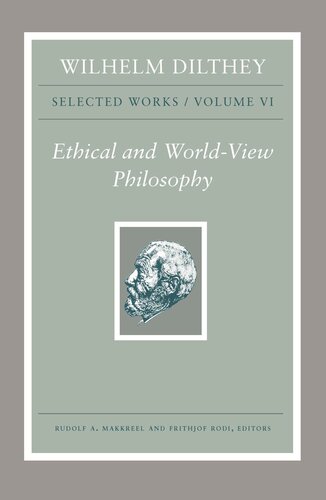

Most ebook files are in PDF format, so you can easily read them using various software such as Foxit Reader or directly on the Google Chrome browser.
Some ebook files are released by publishers in other formats such as .awz, .mobi, .epub, .fb2, etc. You may need to install specific software to read these formats on mobile/PC, such as Calibre.
Please read the tutorial at this link: https://ebookbell.com/faq
We offer FREE conversion to the popular formats you request; however, this may take some time. Therefore, right after payment, please email us, and we will try to provide the service as quickly as possible.
For some exceptional file formats or broken links (if any), please refrain from opening any disputes. Instead, email us first, and we will try to assist within a maximum of 6 hours.
EbookBell Team

4.1
70 reviewsThis is part of a six-volume translation of the main writings of Wilhelm Dilthey (1833-1911) is intended to make available to English readers translations of complete texts representing the full range of Dilthey’s philosophical views including his principle writings on psychology, aesthetics, ethics, and pedagogy, together with some historical essays and literary criticism.
This book completes a landmark six-volume translation of the major writings of Wilhelm Dilthey (1833–1911), a philosopher and historian of culture who continues to have a significant influence on philosophy, hermeneutics, and the theory of the human sciences. These volumes make available to English readers texts that represent the full range of Dilthey's work.
The works in this volume present Dilthey's most deeply held views about philosophy and how it can guide human practices. System of Ethics (1890) argues that Humean sympathy motivates us only externally and must be replaced with the internally motivated fellow-feeling of solidarity that respects others as ends in themselves. The Essence of Philosophy (1907) demonstrates how philosophy has developed from its traditional metaphysical role to the epistemological and encyclopedic functions that ground and order the natural and human sciences. The work also discloses an orientational function of philosophy that is explored further in "The Types of World-View and Their Development" (1911). Philosophical world-views are important in that they address the existential needs and riddles that grow out of life experience and are not solved by any of the sciences.
In addition, the book features three other significant essays. "Present Day Culture and Philosophy" (1898) concerns the challenges to philosophy posed by contemporary culture. "Dream" (1903) is about the thinkers portrayed in Raphael's School of Athens and Dilthey's worries about them breaking up into three divergent groups. Finally, "The Problem of Religion" (1911) considers how religiosity can still inform lived experience in secular times.